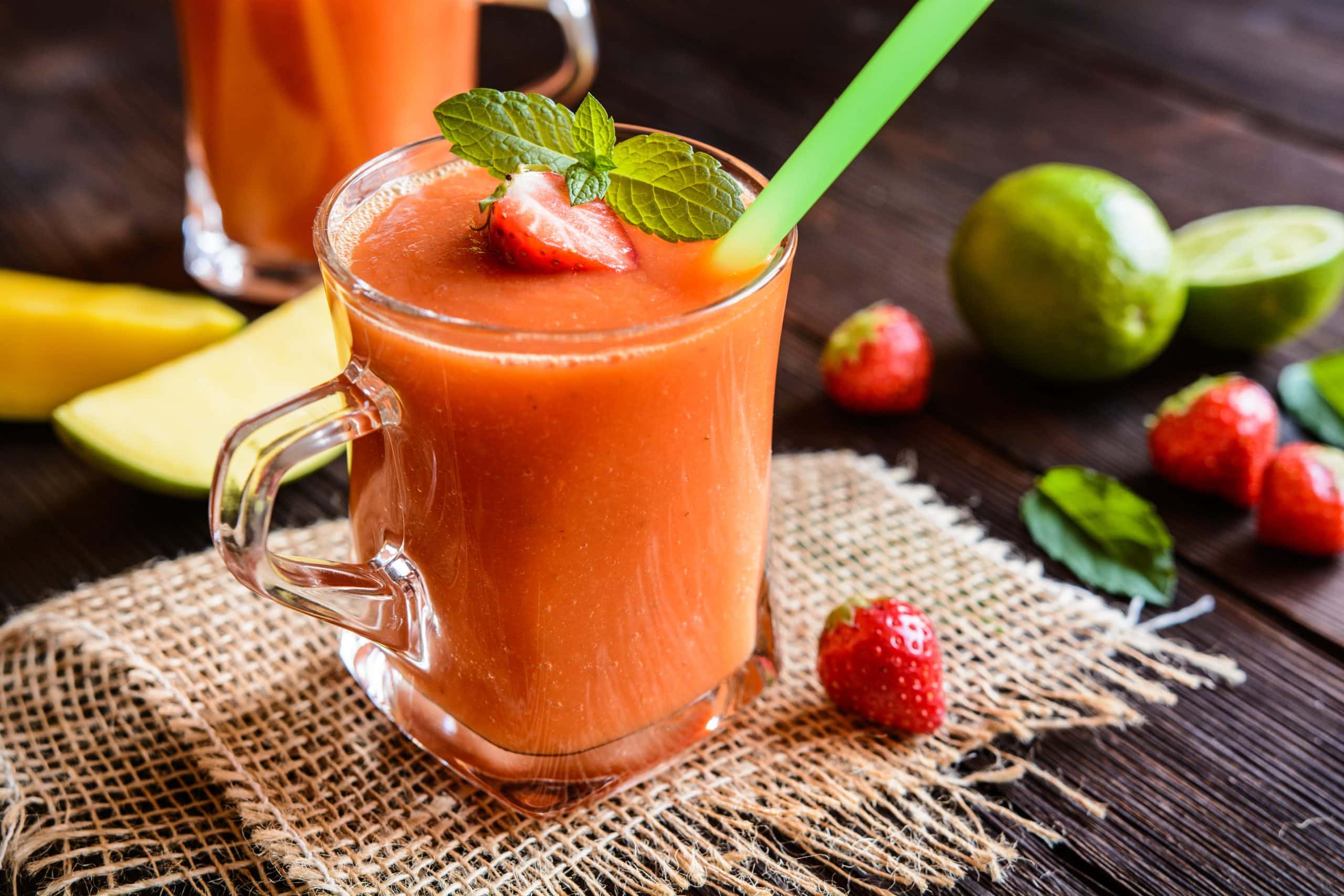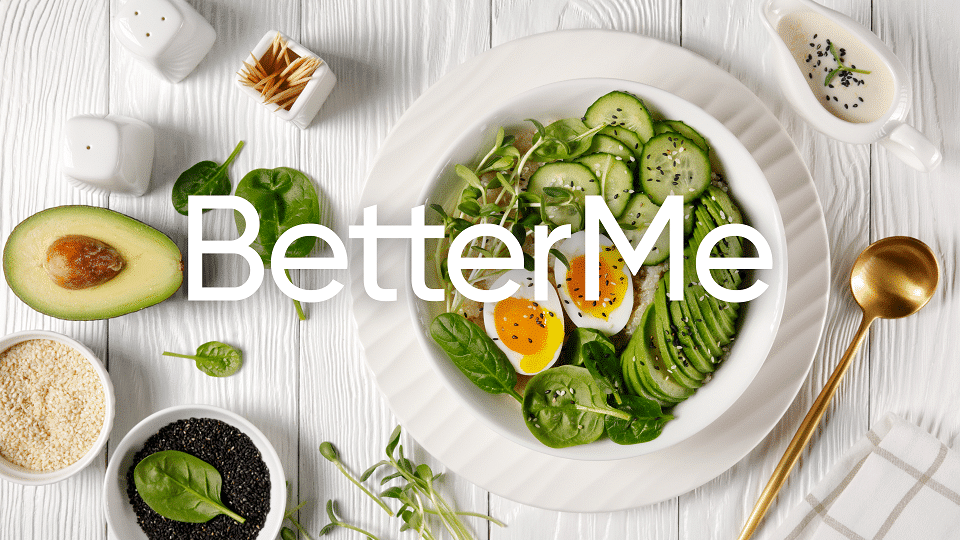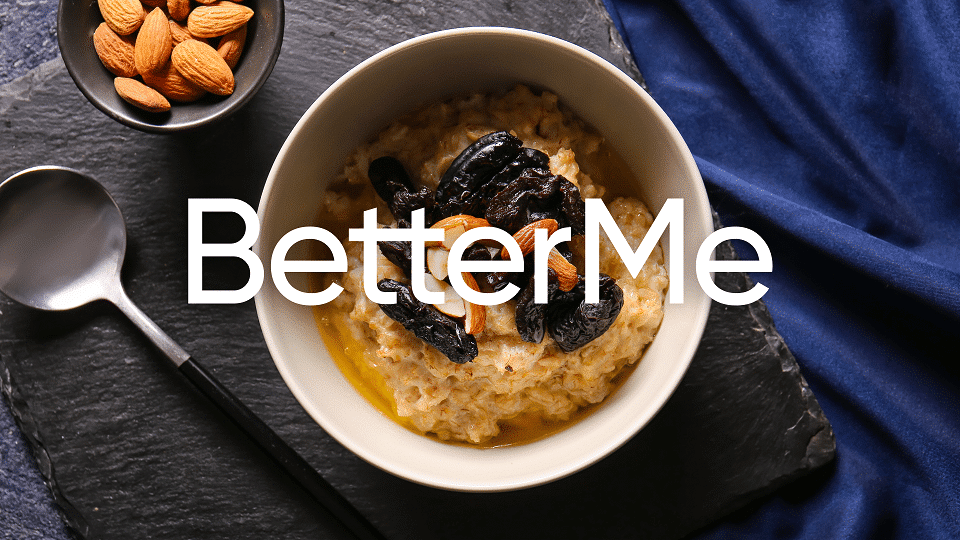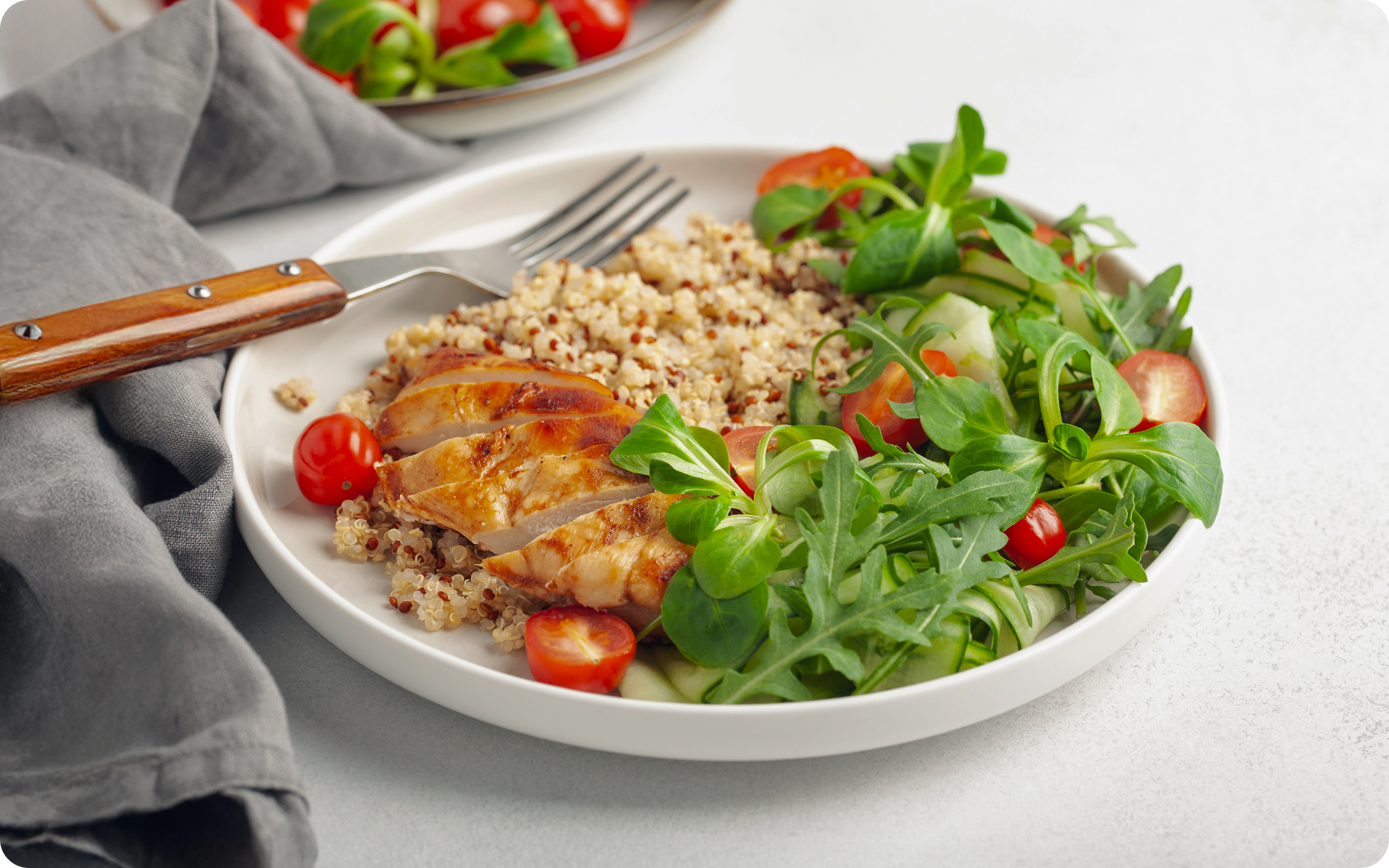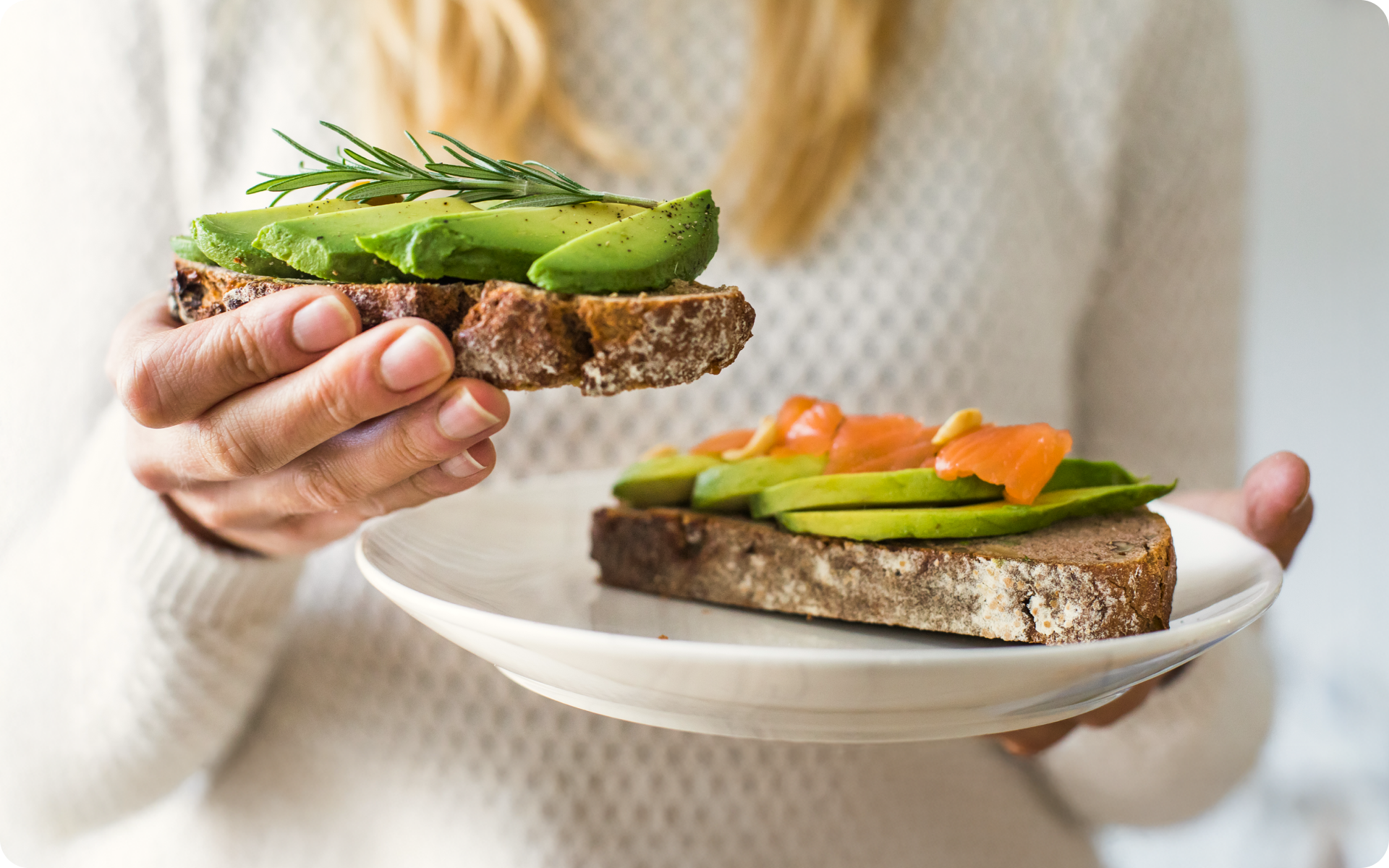Feeling groggy in the morning? You may not be eating the right breakfast foods. According to nutrition experts, some foods are better than others when it comes to starting your day with a boost of energy (4).
Get your personalized
meal plan!
The journal Nutrients published a review which outlined the need for research in order to define and establish guidelines for optimal breakfast food and nutrient intakes (4). It suggests that adolescents who have a high-quality breakfast are thought to to have better energy levels and improved cognitive performance throughout the day. Adults who eat breakfast may also have better health outcomes. So, what makes up a high-quality breakfast? The answer may surprise you.
How Do You Get Energy From Breakfast?
Energy, as we know it, is the result of many biochemical processes that occur in the body. In order to turn food into energy, the body must first break down the nutrients into simpler molecules that can be used by cells for fuel (11).
This process is known as metabolism and it requires a lot of energy itself. In fact, metabolism accounts for the majority of the energy used by the body every day.
All foods provide the body with some form of energy, but not all foods are created equal. The type of food you eat can either help or hinder your body’s ability to produce energy.
For example, complex carbohydrates like those found in whole grains take longer to break down and therefore provide a slow and steady release of energy throughout the day.
On the other hand, simple carbohydrates like those found in candy and white bread are quickly broken down and can cause a spike in blood sugar/energy levels followed by a crash (6).
So, to get energy from breakfast, you must choose foods that are:
- High in protein: Protein takes longer to break down than carbohydrates, so it provides a slow and steady release of energy (2).
- High in fiber: Fiber helps regulate blood sugar levels and keeps you feeling fuller longer (7). It’s also good for digestive health.
- Low in sugar: Too much sugar can cause a spike in blood sugar levels followed by a crash (4).
- Hydrating: Dehydration can cause fatigue, so it’s important to start your day with a glass of water or another healthy beverage.
- Rich in energizing micronutrients: Micronutrients like iron, magnesium, and B vitamins are essential for energy production.
With that in mind, let’s take a look at the best and worst foods to eat for breakfast if you’re looking for an energy boost.
Read More: Keto Breakfast Without Eggs: Easy Keto No Eggs Breakfast Ideas
The Best Breakfast Foods For Energy
Oatmeal
Oatmeal ranks highly on the list of energizing breakfast foods for several reasons. First, it’s packed with complex carbohydrates that provide the body with a slow and steady release of energy (6).
In addition, oatmeal is high in fiber which helps regulate blood sugar levels and keeps you feeling fuller longer (7). Oats are also a good source of magnesium, a micronutrient that’s essential for energy production (4).
Other whole grains that make the list of best breakfast foods for energy include quinoa, wheat germ, and whole-grain bread.
Eggs
Eggs are another great option for breakfast if you’re looking for an energy boost. They’re high in protein, which takes longer to break down than carbohydrates and provides a slow and steady release of energy (2). It is also important for muscle building and recovery if you exercise.
Eggs are also a good source of iron, another micronutrient that’s essential for energy production (4).
Nuts And Nut Butter
Nuts and nut butter are excellent sources of healthy fats, protein, and fiber. Like eggs, they provide a slow and steady release of energy that can help you stay focused and productive all day long (8).
Note that nuts and nut butter are also high in calories, so be sure to portion them out accordingly. A small handful of nuts or a tablespoon of nut butter is all you need.
Coffee
Coffee is often cited as one of the best breakfast beverages for energy– and this comes with a good reason.
Coffee contains caffeine, a stimulant that has been shown to increase alertness and improve focus (5). It is also a source of antioxidants, which can help protect your cells from damage caused by oxidative stress.
Just be sure to limit yourself to a cup or two per day to avoid the negative effects (5). There’s a risk of developing anxiety, irritability, and insomnia if you consume too much coffee due to its caffeine content (5).
Green Tea
Like coffee, green tea contains caffeine, a stimulant that can increase alertness and improve focus (5).
Green tea also contains L-theanine, an amino acid that has been shown to promote relaxation without causing drowsiness, although at higher doses than typically found in tea (12).
It is also a good alternative to coffee if you’re sensitive to caffeine or you’re looking for a more calming energy boost.
If you struggle to even flirt with the idea of giving up your favorite foods or working out till your legs give way – BetterMe app is here to breathe a fresh perspective into the way you view the weight loss process! Check out the app and experience the fun side of fitness and dieting with BetterMe!
Greek Yogurt
Greek yogurt is a good source of protein, which takes longer to break down than carbohydrates and provides a slow and steady release of energy (2).
It’s also a good source of calcium, a micronutrient that’s essential for cell function. The probiotic bacteria in yogurt can also improve gut health, which can result in increased energy levels (9). Greek yogurt can be enjoyed on its own or used as a base for a healthy breakfast bowl.
Combine it with your preferred power foods such as nuts, seeds, fruit, and whole-grain cereal for a satisfying and energizing meal.
Chia Seeds
Chia seeds are a good source of fiber, protein, and healthy fats. They’re also rich in antioxidants and minerals like iron, magnesium, and calcium.
Soak chia seeds in water or milk overnight to make a nutrient-rich breakfast porridge or add them to smoothies, yogurt, or oatmeal for an energy boost.
Ground Flaxseed
Ground flaxseed is a good source of fiber, healthy fats, and antioxidants. It’s also a good plant-based source of omega-3 fatty acids, which are essential for many processes in the body(13).
Add ground flaxseed to smoothies, yogurt, oatmeal, or baked goods for an energy boost.
Avocado
Avocados are packed with healthy fats that can help you feel full and satisfied. Eating avocados in the morning can help you stay fuller longer, which may lead to eating fewer calories later in the day (3).
The micronutrient profile of avocados is also impressive. Avocados are a good source of potassium, an essential electrolyte. They’re also a good source of B vitamins, which are important for energy production, and fiber (3).
You can eat avocado on toast, in a breakfast bowl, or as part of a healthy breakfast sandwich.
Green Smoothie
A green smoothie is a great way to get a dose of nutrients first thing in the morning.
Green smoothies are packed with vitamins, minerals, and antioxidants. They’re also a good source of fiber and protein, both of which can help you stay fuller longer (7, 2).
Some ideal, energy-boosting ingredients to add to your green smoothie include spinach, kale, avocado, banana, and chia seeds.
Read More: Keto Breakfast Casserole Recipe Ideas
Worst Breakfast Foods For Energy
Eating the wrong foods for breakfast can leave you feeling tired and sluggish.
Here are some of the worst breakfast foods for energy:
White Bread
White bread is made from refined flour, which has been stripped of its nutrient-rich bran and germ. This process makes white bread lower in fiber and higher in simple carbs than whole grain bread.
Eating white bread can cause a quicker increase in blood sugar levels, leading to a quick burst of energy followed by an energy crash (6).
Other refined, processed carbs like biscuits, pastries, and breakfast cereals can have a similar effect on energy levels.
Sugary Breakfast Cereals
Many kinds of breakfast cereals are made from refined grains and loaded with sugar. These cereals can cause a quicker increase in blood sugar levels, leading to a quick burst of energy followed by an energy crash (6).
Although they are fortified with vitamins and minerals, the trade-off in terms of energy levels may not be worth it.
A healthier alternative is cereals that are made from whole grains and contain little to no added sugar.
Bacon And Sausage
Bacon and sausage are high in saturated fat and salt. These unhealthy ingredients can contribute to weight gain, high blood pressure, and other chronic health conditions (10).
The occasional indulgence is fine, but eating bacon and sausage regularly can have a negative impact on energy levels.
A healthier alternative is to choose leaner sources of protein such as grilled chicken or fish, tofu, legumes, and eggs to start your day.
Whether you’re a workout beast or just a beginner making your first foray into the world of fitness and dieting – BetterMe has a lot to offer to both newbies and experts! Install the app and experience the versatility first-hand!
Fruit Juice
Fruit juice is often thought of as a healthy breakfast option. However, most fruit juices are made from concentrate and contain high amounts of sugar.
Fruit juice can cause a quick rise in blood sugar levels, leading to a quick burst of energy followed by an energy crash (1).
A better option is to eat whole fruits, which have natural sugar but are packed with fiber and other nutrients. If you do opt for juice, make sure it’s 100% fruit juice with no added sugar, and remember that the recommended serving size is 4 fluid ounces (½ cup).
The Bottom Line
An energizing breakfast is an important part of a healthy diet. The best breakfast foods for energy are high in protein and fiber and low in sugar. On the other hand, the worst breakfast foods for energy are high in sugar and low in nutrients.
DISCLAIMER:
This article is intended for general informational purposes only and does not serve to address individual circumstances. It is not a substitute for professional advice or help and should not be relied on for making any kind of decision-making. Any action taken as a direct or indirect result of the information in this article is entirely at your own risk and is your sole responsibility.
BetterMe, its content staff, and its medical advisors accept no responsibility for inaccuracies, errors, misstatements, inconsistencies, or omissions and specifically disclaim any liability, loss or risk, personal, professional or otherwise, which may be incurred as a consequence, directly or indirectly, of the use and/or application of any content.
You should always seek the advice of your physician or other qualified health provider with any questions you may have regarding a medical condition or your specific situation. Never disregard professional medical advice or delay seeking it because of BetterMe content. If you suspect or think you may have a medical emergency, call your doctor.
SOURCES:
- 100 % Fruit juice and measures of glucose control and insulin sensitivity: a systematic review and meta-analysis of randomised controlled trials (2017, nih.gov)
- 4 ways to boost your energy naturally with breakfast (2019, harvard.edu)
- Avocados (2022, harvard.edu)
- Breakfast in Human Nutrition: The International Breakfast Research Initiative (2018, nih.gov)
- Caffeine (n.d., vic.gov)
- Carbohydrates and Blood Sugar (n.d., harvard.edu)
- Health benefits of dietary fiber (2009, pubmed.gov)
- Health Benefits of Nut Consumption (2010, nih.gov)
- Health benefits of taking probiotics (2020, harvard.edu)
- Health effects of saturated and trans-fatty acid intake in children and adolescents: Systematic review and meta-analysis (2017, nih.gov)
- How Cells Obtain Energy from Food (2002, nih.gov)
- L-theanine, a natural constituent in tea, and its effect on mental state (2008, nih.gov)
- The science behind dietary omega-3 fatty acids (2008, nih.gov)
